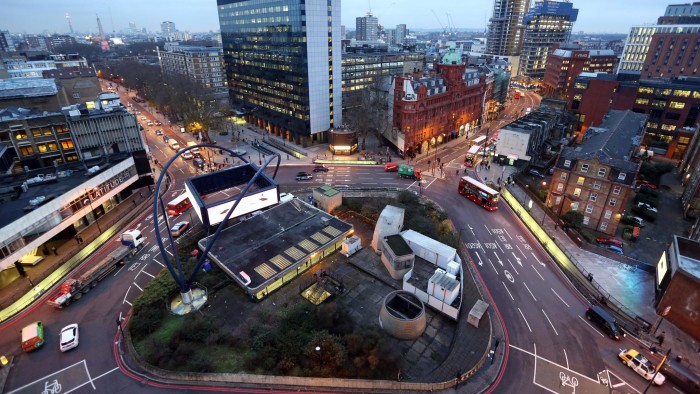More cities aim to establish start-up clusters

Roula Khalaf, Editor of the FT, selects her favourite stories in this weekly newsletter.
Andrew Daniels, founder of a web design and mobile app developer based in Manchester, believes his “can do” city has the potential to expand as a technology hub to match such European centres as Stockholm and Berlin.
“There’s immense pride in being from Manchester and maybe a bit of arrogance, which brings us together to punch above our weight,” says Mr Daniels, managing director of Degree 53, which was spun out of the gambling industry in 2013 and is moving into sectors such as financial services.
All over the world, cities are laying claim to be the next hotspot for technology start-ups, boosted by the rise of mobile computing, which has created a big market for international entrepreneurs and made it cheaper and easier to build businesses.
It raises the question of how many second-tier centres can achieve sustainable success, and whether they can hold on to their start-ups as they grow or see them migrate to larger centres such as London, New York and California, as has often happened in the past.
Mr Daniels can envisage opening a London office one day, although he does not expect to move his developers there. Manchester has a promising cluster of media and financial technology companies, yet still needs to work on access to capital and building a skilled workforce.
Two-thirds of tech start-ups that have gained a $1bn valuation in the past decade — so-called “unicorns” — hailed from outside California’s Silicon Valley, according to research by Atomico, the London-based venture capital group led by Skype co-founder Niklas Zennström.
Silicon Valley remained the most prominent tech hub with 63 unicorns out of 182, but was followed by Beijing (23), New York (11), London (7), Stockholm (5), Berlin (5) and Los Angeles (4). Tom Wehmeier, Atomico’s head of research, believes the growth of clusters outside technology’s Californian stronghold will accelerate.
Cities such as London, Stockholm, Berlin and Helsinki are places where “success breeds success”, he says. “These hubs start to become magnets for the inflow of entrepreneurs, talent and capital.” That makes it less likely that entrepreneurs will look elsewhere to grow, he thinks.
Beneath that level, cities such as Barcelona, Dublin, Amsterdam and Budapest are ambitious. In the US, New York’s tech scene has expanded massively and cities such as Austin in Texas, and Raleigh in North Carolina, have promising industries. In Asia, Beijing, Tokyo, Shanghai and Bangalore have seen rapid growth in venture capital deals, while Singapore has a growing start-up sector.
Michael Mandel, chief economic strategist at the Progressive Policy Institute in Washington, believes the examples of New York and London are “tremendously heartening for other cities, because they show that it’s possible to develop urban tech hubs outside the traditional Silicon Valley/Route 128 suburban environments”.
Twitter Q&A

How do you get funding? What are the pros and cons of different sources of financing? Put your questions to the experts. Join the FT Twitter chat using #FTentrepreneurs on Friday 5 June at 12.30 in Monaco (11.30 BST)
Even as recently as 2007, he says, nobody would have predicted that New York and London would be so successful. And both were expected to experience dire times because of the financial crisis.
One reason they have done well, Mr Mandel says, is that they have fused tech with content areas such as media, finance, advertising and fashion. They also have high density and connectivity.
To succeed, clusters need an ecosystem including capital, talent, support structures such as co-working space and services such as law and PR companies. Venture capital has flowed into the European technology scene recently, much of it from the US, though it remains below levels available in Silicon Valley.
Successful clusters tend to be in attractive cities. “There is at this moment no more vibrant metropole in the world with a better life standard in quality and price than Berlin,” says Lenard Krawinkel, founder and chief executive of Zoobe, developer of an animated mobile phone messaging app.
His company has people from 14 countries among its 30 staff, including Nepal, Argentina and Syria. Mr Krawinkel believes that if companies choose to move abroad, it will no longer be for lack of funding but because their markets demand a physical presence elsewhere.
Berlin has bred billion-dollar companies including food-ordering service Delivery Hero and fashion website Zalando, but Mr Krawinkel says it needs more. “We need to show it’s possible to grow.”
In Stockholm, Pär Hedberg, founder and chief executive of business incubator Stockholm Innovation & Growth (Sting), says that while companies often expand commercial operations abroad, they are more likely than in the past to keep their founders and developers in the city, as Spotify (music streaming), Klarna (payment services) and Mojang (video games) have done.
One weakness in Europe, he says, is that large corporations take less interest in buying or partnering with start-ups than in the US. Mr Hedberg is trying to change that by chairing Things, a centre that connects industrial companies such as Husqvarna and Assa Abloy with start-ups that have innovative ideas for the “internet of things”.
But how many cities can match London, New York, Berlin or Stockholm? In the UK, research by Tech City UK, a government body, identified more than 20 digital clusters including Greater Manchester, Liverpool, Bournemouth and Brighton. Those outside the capital were boosted by cheap rents, availability of broadband and skilled staff and links with universities, though a third of companies identified access to finance as a problem.
“In the UK it’s growing and elsewhere everyone is claiming to be an amazing tech cluster,” says Eddie Copeland, head of technology policy at Policy Exchange think-tank. “I am sure they are not all the next Silicon Valley, but where they are playing to local strengths a reasonable number will stand a chance of being successful.”
Comments